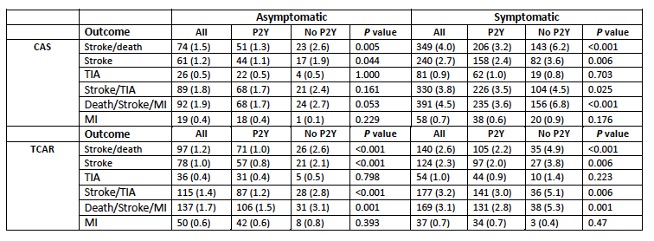Periprocedural P2y12 Inhibitors Improve Perioperative Outcomes After Carotid Stenting By Primarily Decreasing Strokes
Adele Heib1, Heepeel Chang, MD2, Caron B. Rockman, MD2, Neal Cayne, MD2, Glenn Jacobowitz, MD2, Virendra Patel, MD3, Thomas Maldonado, MD2, Karan Garg, MD4.
1Albert Einstein College of Medicine, Bronx, NY, 2NYU Langone Health, New York, NY, 3Columbia University Medical Center, New York, NY, 4NYU Langone Medical Center, New York, NY.
Objective: The continuation of antiplatelet agents in the periprocedural period around carotid stenting (TF-CAS and TCAR) procedures is felt to be mandatory in order to minimize the risk of periprocedural stroke. The objective of this study was to evaluate the periprocedural effect of P2Y12 inhibitors on carotid stenting.Methods: The SVS VQI was used from 2007 - 2020 to identify alll TCAR and TF-CAS procedures. Patients were stratified based on preoperative use of P2Y12 inhibitors. Primary endpoints were perioperative neurologic events, myocardial infarction and composite endpoints of stroke/death/MI. Results: Over 30,000 carotid stent procedures were included for analysis, with 49.8% TCAR and 50.2% TF-CAS cases. Overall, 82.3% of patients were on a P2Y12 inhibitor. P2Y12 inhibitors were significantly more likely to be used in TCAR cases than in TF-CAS cases (87.3% vs. 76.8%, p<0.001). The rate of periprocedural neurologic events in the whole cohort was 2.6%. Patients on P2Y12 inhibitors were significantly less likely to experience a periprocedural neurologic event (2.3% vs. 3.9%, p<0.001) and periprocedural mortality (0.6% vs. 2.1%, p<0.001). Stratified by approach and patient symptoms, decreased strokes were the primary driver of improved outcomes in patients on P2Y12 inhibitors (Table). There was no effect on rates of myocardial infarction. On multivariate analysis, the use of P2Y12 inhibitors demonstrated an independent significant effect in reducing of the rate of perioperative stroke (Odds Ratio 0.29, 95% CI 0.25-.33). Finally, additional analysis of the types of P2Y12 inhibitors used revealed that all appeared to be equally effective in reducing the periprocedural neurological event rate.Conclusions: Continuation of P2Y12 inhibitors in the periprocedural period appears to markedly reduce the perioperative neurological event rate with TCAR and TF-CAS, and should be considered mandatory. Patients with contraindications to P2Y12 inhibitors may not be appropriate candidates for any carotid stenting procedure. Additionally, alternative types of P2Y12 inhibitors appear to be equally effective as compared to clopidogrel. Finally, analysis of the VQI demonstrates that even for TCAR cases, only 87.3% of cases appear to be on P2Y12 inhibitors in the periprocedural period, leaving room for significant improvement. 
Back to 2022 Abstracts
